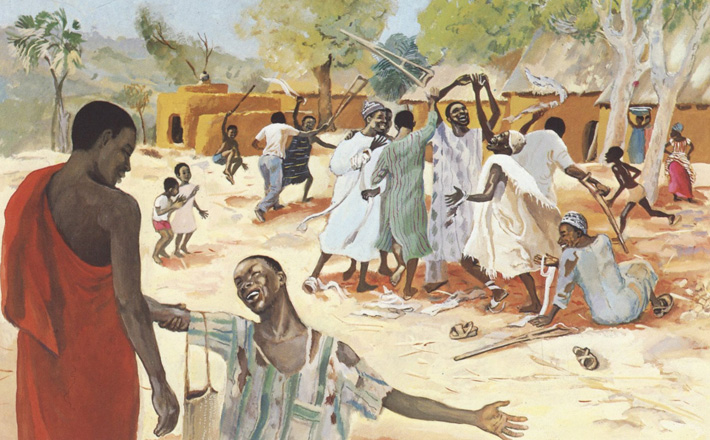Commentary on Jeremiah 29:1, 4-7
The truncated text of the lectionary selection distorts the message of the Jeremiah 29.
The dissonance of the injunctions to build a life in Babylon and to seek its welfare is muted, if not actually removed. The resulting distortion can easily sentimentalize the text into a generalized word of optimism for difficult times.
Jeremiah 29:2-3 are important because they key the reader into the double audience of Jeremiah’s message. The immediate audience of Jeremiah’s letter is the community in exile in Babylon: King Jeconiah, the queen mother, court officials, etc. (29:2). The second audience is those who remain in Judah and Jerusalem and who face a coming day of destruction: King Zedekiah, additional priests such as Zephaniah (29:24, 29) and other “kinfolk who did not go out into exile” (29:16). The former were exiled in 597 BCE; the latter will experience the destruction of Jerusalem in 587 BCE.
Jeremiah’s prophetic preaching is opposed in four consecutive chapters, chapter 29 being the last. Chapter 26 raised the possibility that Jerusalem could be marked for destruction. The sheer naming of that possibility in the threat portion of a call for repentance leads to sharp opposition from the establishment in Jerusalem. This conflict emerges prior to 597 BCE.
The opposition in chapters 27 and 28 is set in the period between 597 BCE and 587 BCE. The prophets in Jerusalem are preaching words of hope. Their view of the future is that the effects of the destruction of 597 BCE will soon be reversed and that there is no threat of future judgment. The prophet Hananiah specifically states that the reversal will occur in less than two years (Jeremiah 28:3). One could easily imagine the prophetic opponents of Jeremiah in Jerusalem tell their hearers to build houses, plant gardens, and have children as Jeremiah does in his letter to the exiles (Jeremiah 29:6-7). Words of hope spoken in Jerusalem between 597 BCE and 587 BCE are a lie; they are an act of rebellion against God.
Jeremiah’s message shifts as one proceeds from chapter 26 through 29. In chapter 26, if the people listen, they will avoid becoming “like Shiloh.” In context, the implication is that they will avoid destruction by Babylon. They did not listen and the devastation of 597 BCE occurred. After 597 BCE, a second and more extensive destruction looms. Jeremiah increasingly sees it as inevitable because of their persistent rebellion, but still there is an offer of a way to life, not death. If the people submit to Babylonian rule, they can live. That is a fundamental shift in the usual “if/then” construction of a call for repentance. There will be — not might be — a punishment; a yoke is in the future (Jeremiah 27:2). Submitting to it will be the way to life (see, 27:11 spoken to foreign countries and 27:17 spoken to Jerusalem). Not to submit is the way to death — the yoke of wood becomes a yoke of iron bars (28:14). The struggle between Jeremiah and Hananiah in Jeremiah 28 is replicated in Jeremiah 29 by prophets living in exile. As was the case with Hananiah, the latter are also promising a short period of Babylonian domination and an early return of people and property.
The opposition to Jeremiah’s prophetic preaching started with the leadership denying the possibility of divine judgment symbolized by Shiloh. Jeremiah was labeled unpatriotic and disloyal because he spoke of a future that was not limited by a myth of exceptionalism. When the invasion of 597 BCE punctured the assumption of security provided by that myth, the prophets and priests who opposed Jeremiah asserted that the judgment was a brief disruption to the myth, not a divine “NO.” Between 597 BCE and 587 BCE the opposition to Jeremiah’s commissioned prophetic word minimized the divine judgment. Whether termed denial or minimization, the possibility of a definitive judgment was rejected both in Jerusalem and among the early exiles in Babylon. Jeremiah characterized this conduct as rebellion. A yoke of iron bars was approaching Jerusalem; nothing could mitigate its impact.
Chapter 29 does announce that the judgment (i.e., the yoke of iron bars) will not become an eternal NO, but the length of the judgment will be long. It awaits the completion of Babylon’s run at imperial tyranny (symbolized by the number 70 [Jeremiah 29:10]). It will not be the two years Hananiah prophesied or the quick turnaround implied by the prophets Jeremiah opposes in the latter half of chapter 29. There is a future that does not include Babylonian captivity. But that future is not now and it includes praying, searching, calling that is not answered in the moment of petitioning (29:13-14). When the time is up (i.e., the exile is completed), then God will be find-able and will respond with deliverance. During “the 70 years” the people are to invest in life, but it will be a life also characterized by the non-visiting of God. There is no imminent visit of deliverance, unlike that promised by the lying prophets and their dreams.
The contrast between Jeremiah and the voices of false hope is not simply a matter of imminent reversal versus far-off restoration. The specific verses in the lectionary announce a positive message for the present life of the audience. In the form of imperatives to build, plant, and live out the cycles of family life, there is an inherent benediction. God commands these activities but in the command is also the announcement of life that is not characterized by the cruel punishment associated with captivity. Shelter, food, and family life — the basics necessary for life — will be sustainable present. There is abundant blessing — enough to even seek the welfare of those not directly members of the community — but deliverance from exile and return to Jerusalem is intertwined with the eventual demise of Babylon. To be commanded to build houses, plant gardens, raise children, and seek the welfare of the city into which God has sent them into exile is to be blessed in the midst of punishment. The exiles are given a vocation as they await the “attention” (Jeremiah 27:22) or “visit” (29:10) of divine deliverance. Accepting this vocation is a rejection of the false hope of the rebellious voices back in Jerusalem and present among them in exile — voices which promise a quick restoration of greatness.


October 9, 2016